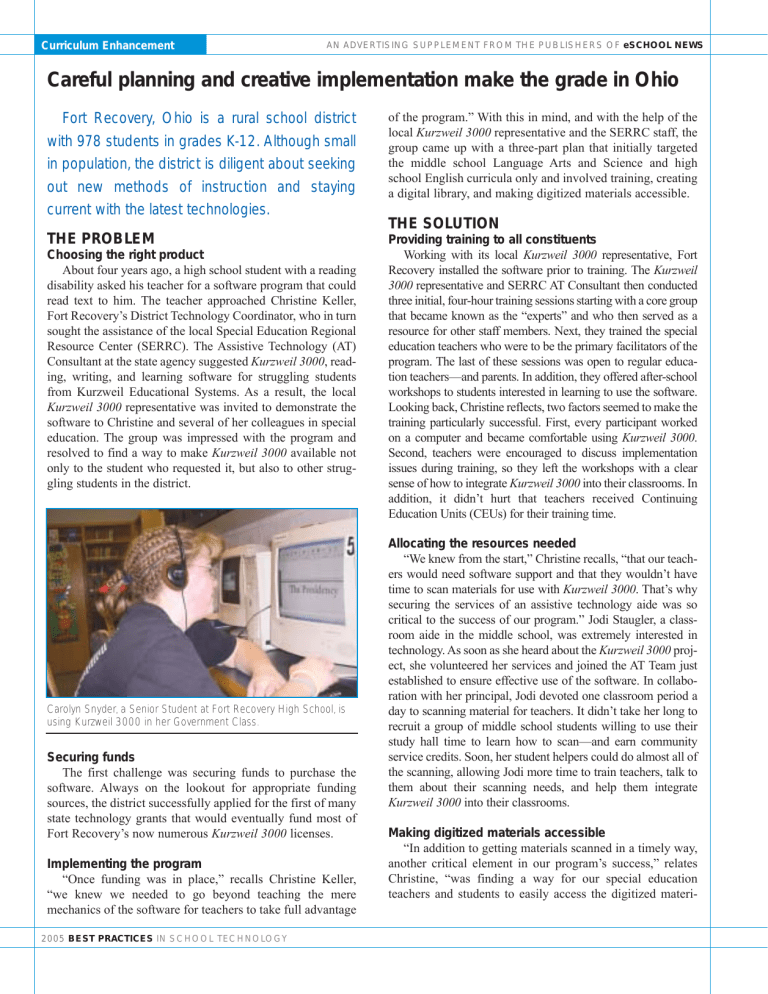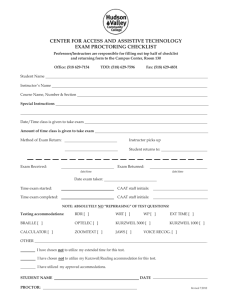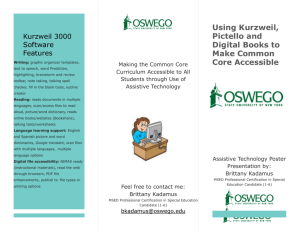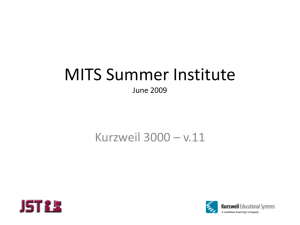Careful planning and creative implementation make the grade in Ohio

Curriculum Enhancement AN ADVERTISING SUPPLEMENT FROM THE PUBLISHERS OF eSCHOOL NEWS
Careful planning and creative implementation make the grade in Ohio
Fort Recovery, Ohio is a rural school district with 978 students in grades K-12. Although small in population, the district is diligent about seeking out new methods of instruction and staying current with the latest technologies.
THE PROBLEM
Choosing the right product
About four years ago, a high school student with a reading disability asked his teacher for a software program that could read text to him. The teacher approached Christine Keller,
Fort Recovery’s District Technology Coordinator, who in turn sought the assistance of the local Special Education Regional
Resource Center (SERRC). The Assistive Technology (AT)
Consultant at the state agency suggested Kurzweil 3000, reading, writing, and learning software for struggling students from Kurzweil Educational Systems. As a result, the local
Kurzweil 3000 representative was invited to demonstrate the software to Christine and several of her colleagues in special education. The group was impressed with the program and resolved to find a way to make Kurzweil 3000 available not only to the student who requested it, but also to other struggling students in the district.
Carolyn Snyder, a Senior Student at Fort Recovery High School, is using Kurzweil 3000 in her Government Class.
Securing funds
The first challenge was securing funds to purchase the software. Always on the lookout for appropriate funding sources, the district successfully applied for the first of many state technology grants that would eventually fund most of
Fort Recovery’s now numerous Kurzweil 3000 licenses.
Implementing the program
“Once funding was in place,” recalls Christine Keller,
“we knew we needed to go beyond teaching the mere mechanics of the software for teachers to take full advantage
2005 BEST PRACTICES IN SCHOOL TECHNOLOGY of the program.” With this in mind, and with the help of the local Kurzweil 3000 representative and the SERRC staff, the group came up with a three-part plan that initially targeted the middle school Language Arts and Science and high school English curricula only and involved training, creating a digital library, and making digitized materials accessible.
THE SOLUTION
Providing training to all constituents
Working with its local Kurzweil 3000 representative, Fort
Recovery installed the software prior to training. The Kurzweil
3000 representative and SERRC AT Consultant then conducted three initial, four-hour training sessions starting with a core group that became known as the “experts” and who then served as a resource for other staff members. Next, they trained the special education teachers who were to be the primary facilitators of the program. The last of these sessions was open to regular education teachers—and parents. In addition, they offered after-school workshops to students interested in learning to use the software.
Looking back, Christine reflects, two factors seemed to make the training particularly successful. First, every participant worked on a computer and became comfortable using Kurzweil 3000.
Second, teachers were encouraged to discuss implementation issues during training, so they left the workshops with a clear sense of how to integrate Kurzweil 3000 into their classrooms. In addition, it didn’t hurt that teachers received Continuing
Education Units (CEUs) for their training time.
Allocating the resources needed
“We knew from the start,” Christine recalls, “that our teachers would need software support and that they wouldn’t have time to scan materials for use with Kurzweil 3000. That’s why securing the services of an assistive technology aide was so critical to the success of our program.” Jodi Staugler, a classroom aide in the middle school, was extremely interested in technology. As soon as she heard about the Kurzweil 3000 project, she volunteered her services and joined the AT Team just established to ensure effective use of the software. In collaboration with her principal, Jodi devoted one classroom period a day to scanning material for teachers. It didn’t take her long to recruit a group of middle school students willing to use their study hall time to learn how to scan—and earn community service credits. Soon, her student helpers could do almost all of the scanning, allowing Jodi more time to train teachers, talk to them about their scanning needs, and help them integrate
Kurzweil 3000 into their classrooms.
Making digitized materials accessible
“In addition to getting materials scanned in a timely way, another critical element in our program’s success,” relates
Christine, “was finding a way for our special education teachers and students to easily access the digitized materi-
Curriculum Enhancement AN ADVERTISING SUPPLEMENT FROM THE PUBLISHERS OF eSCHOOL NEWS als.” Fort Recovery placed a Kurzweil 3000 folder, organized by grade, subject, and textbook, on its computer network.
Then, teachers and students could click on the Kurzweil 3000 folder to get the material they needed. Storing documents in a centralized location helped prevent duplication of scanning efforts and made scanned documents available to all teachers and students using the program.
Providing a tool for life
“The benefits of Kurzweil 3000 are very apparent,”
Christine reflects. Students previously reading below grade level, including the high school student that initially requested text-to-speech software, can now read materials commensurate with their own abilities and interests; students who were once totally dependent on human support can now work independently and in less time; and teachers can devote their energy to instruction. Pleased with these results, Fort Recovery has expanded the use of Kurzweil
3000 beyond seventeen middle and high school students taking Language Arts, Science, or English. Currently, some forty-five students in grades 3-12 use Kurzweil 3000 in at least one of the following subject areas: Language Arts,
Reading, Literature, Social Studies, History, Government,
Economics, and Science. And the district is initiating a pilot project to allow students to use Kurzweil 3000 as an accom-
Derek Wendel, a 6th Grade Student at Fort Recovery Middle School, uses Kurzweil 3000 for his Language Arts and Social Studies courses.
modation when taking state mandated tests. However,
Christine is quick to add, “The true benefits of Kurzweil
3000 are the new sense of competence and increased selfesteem felt by students who were unable to read on their own and who now are independent learners.”
BP
800-894-5374 • www.kurzweiledu.com
GET YOUR FREE TRIAL CD
OF KURZWEIL 3000 SOFT WARE
AND HELP EVERY STUDENT
BECOME A BET TER ONE.
When a student’s ability to learn improves, his schoolwork quickly follows suit. Not to mention his self-esteem, his independence, and his confidence in himself. That’s what
Kurzweil 3000, the top reading, writing and learning software for struggling students, is all about.By helping students read class material, write reports and essays, and study for and take tests, Kurzweil 3000 helps you help all your students reach their full learning potential.
Call 1.800.894.5374 or visit www.kurzweiledu.com/myself today for a FREE 30-day Trial
CD and the research summary, Scientifically-Based Research
Validating Kurzweil 3000 .
And make learning something all of your students can feel good about.
Kurzweil Educational Systems, Inc.
781.276.0600 www.kurzweiledu.com
Believe you can
2005 BEST PRACTICES IN SCHOOL TECHNOLOGY



